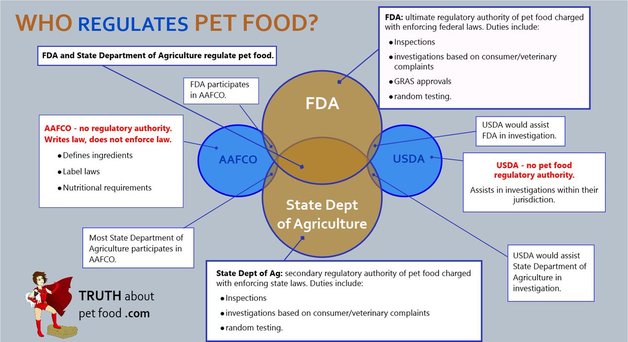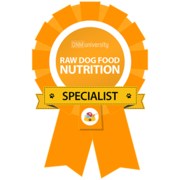Understanding the Pet Food Industry & who regulates itBefore we continue it is important to understand who regulates the main stream pet food industry. USAWe discuss mainly the US regulating bodies and their standards as they are the largest pet food regulating authority in the world. Most other countries use these standards. AAFCO - Association of American Feed Control OfficialsAccording to their website, the Association of American Feed Control Officials (AAFCO) is “an independent membership association of local, state and federal agencies charged by law to regulate the sale and distribution of animal feeds and animal drug remedies.” AAFCO doesn’t have any regulatory authority itself, but its guidelines are used by government agencies. According the their site they have three main goals:
FDA, USDA & CVMThe U.S Food and Drug Administration (FDA) and U.S Department of Agriculture (USDA) regulate the safety of pet foods. The FDA is the ultimate regulating authority regarding that. The FDA monitors food branding, ingredient safety and within the FDA the Center for Veterinary Medicine (CVM) monitors health claims. Only the FDA has the authority to recall pet foods. It is important to note (for later posts) that the FDA makes no distinction between raw and cooked pet foods and that they only test raw foods for contamination. Other countriesSouth Africa
Europe
Canada
2 Comments
6/6/2024 11:02:11 am
I wanted to express my gratitude for your insightful and engaging article. Your writing is clear and easy to follow, and I appreciated the way you presented your ideas in a thoughtful and organized manner. Your analysis was both thought-provoking and well-researched, and I enjoyed the real-life examples you used to illustrate your points. Your article has provided me with a fresh perspective on the subject matter and has inspired me to think more deeply about this topic.
Reply
Leave a Reply. |
ALTERNATIVE HEALING & BLOG DISCLAIMER
Alternative healing articles and any other advice featured in this blog do not claim to replace any conventional veterinary treatment. This is an educational blog for Beagle owners to read about alternative options that we as Beagle owners have tried ourselves and seen positive outcomes. We do not post anything we have not experienced positively and will never endorse anything in which we do not believe through positive experience. Kinesiology and other healing modalities do not diagnose, cure or prescribe, as these activities are the prerogative of veterinarians. Kinesiology may provide a different, energy-based approach to allergy support, and potentially allow for a reduction in the use of corticosteroids. As a kinesiologist, I believe that allergies, just like other ailments, may have an emotional and/or mental aspect which is worth addressing. As such, this modality represents a valid complementary therapy to veterinary care. Categories
All
|
Proudly powered by Weebly









 RSS Feed
RSS Feed